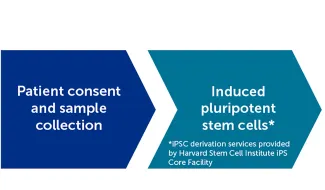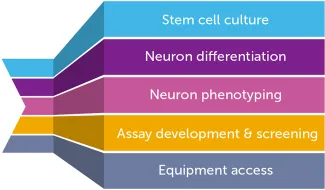Our mission
Boston Children's Hospital's Human Neuron Core (HNC) offers a new paradigm for disease modeling and preclinical drug screening in an academic setting. The mission of the core is to bridge the gap between the clinic and basic researchers and help establish human induced pluripotent stem cell (iPSC)-derived model systems for neurological disorders as well as provide support for preclinical research developing screens to identify novel therapeutics. We have significantly expanded our equipment and services and opened them to the broader research community, such as external academic labs and industry.
The HNC exploits transformative stem cell technology for both modeling of specific diseases and screening of test compounds in human neurons derived from iPSCs. The goals of this service are to:
- Develop standard operating procedures for the generation of different types of neuronal cell lines
- Create neuronal cell lines from iPSCs derived from patients with specific diseases and from healthy controls
- Compare key characteristics (e.g. shape, growth, synaptic connectivity, protein composition) of patient-derived and control-derived neurons
- Identify disease-specific characteristics in patient-derived neurons
- Screen drug candidates in disease-specific cell lines to greatly increase the speed and specificity of drug discovery
- Compare results of these "pre-clinical" drug trials with clinical trials in patients


HNC services
Services fall into main categories:
- The Human Neuron Differentiation Service provides well-characterized human iPSC- derived neurons. We have a hospital-wide IRB to access various disease samples that can be used to create disease-specific iPSCs.
- CRISPR modification services and the generation of isogenic controls
- The Phenotyping Service provides neurite outgrowth and synaptic count assays, various immunostaining assays, highcontent imaging and image analysis, short-term and long-term live imaging andanalysis, multi-electrode array and Ca-imaging functional analyses of iPSC-derived neurons to help answer fundamental biological questions and/or establish assays for screening.
- The expanded Assay Development and Screening Facility provides multiple live-cell screening platforms that can assess image- and activity-based measures of live neurons in a medium/high-throughput capacity. This facility also provides robotics and liquid handlers to improve reproducibility of experiments across screening endeavors.

The HNC has been supported by generous grants from the Massachusetts Life Science Center (MLSC), the Intellectual and Developmental Disabilities Research Center (IDDRC), the Tommy Fuss Center at Boston Children's Hospital, the Lou Lou Foundation for research on CDKL5, equipment grants from Boston Children's Hospital, and anonymous foundation donors.
All the services are available to support translational research programs of internal BCH academic investigators, academic investigators from external institutions worldwide, and industry collaborators. To inquire about a potential project, please reach out to Elizabeth Buttermore at elizabeth.buttermore@childrens.harvard.edu.
